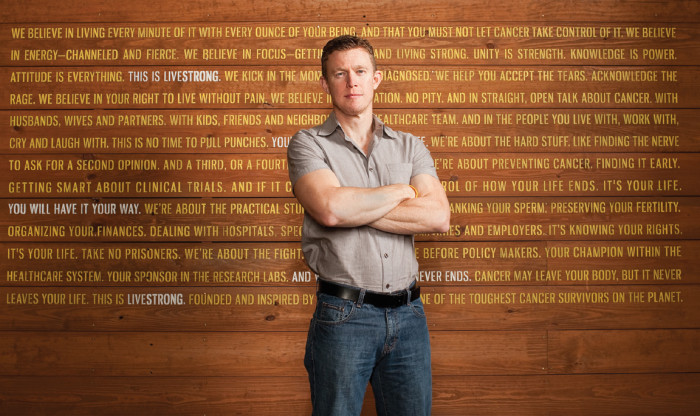You could be forgiven for assuming that Andy Miller is a cyclist. Lean and fit, he has the healthy glow of someone who knows a thing or two about exercising outdoors in Texas. Or maybe it’s easy to assume that everyone who works at Livestrong follows in Lance Armstrong’s footsteps. After all, with Armstrong’s victorious yellow tour de France jerseys hanging on the walls, it’s hard not to feel as if it’s an inherent part of the job description there.
Miller has a different take, though. The executive vice president of mission at Livestrong laughed when he described his cycling experience.
“I loathe it!” he said with a good-natured chuckle. “When I volunteered for the Hill Country Ride for AIDS, it was the most painful experience. I realized the last year I did it that it’s not something I can take seriously, and not something I want people to mistake me for taking seriously–so I rode in a Superman costume.”
Miller may be quick to laugh about his cycling prowess, but he takes his work at Livestrong seriously. No stranger to cancer– Miller had a melanoma a few years ago, and his mother is also a cancer survivor–his work has personal meaning.
“It’s something that I can feel proud about,” Miller said. “That helps me to stick with it and overcome frustrations and challenges because it’s for a greater cause. And now that I have a son, I feel like I’m living a lesson that I want to instill in him–whatever you do, do it because it’s personally meaningful to you, beyond the benefits. Money is nice, but it only motivates you so much.”
At Livestrong, Miller oversees the organization’s outreach programs, including a recent program that targets the LGBT community. While Livestrong has had programs and projects that relate to the LGBT community for a while, coming out with cancer began last year to ensure that resources and information specific to that community exist.
Livestrong’s outreach efforts in general have evolved along with the organization, Miller said. With a grant from the centers for disease control, Livestrong began providing information to medically underserved demographic groups, starting with the Hispanic community. As Livestrong expanded its scope, its outreach efforts and programs also expanded, not just to encompass different races and languages, but to reach individuals based on their age and sexual orientation as well.
“What’s exciting about that is it gives us a rich understanding of how we assist communities,” Miller said. “Being gay myself, it has added significance. I was diagnosed with cancer a few years ago. I had to deal with a lot of the same issues. I was fortunate to just have to have surgery. But it made me think of a lot of things, like my family– what are my risk factors moving forward, and how do I protect my family? My partner and I adopted a son three years ago. What about getting life insurance to protect him?”
Miller also serves on the board of the National LGBT Cancer Network and said the LGBT community does face a particular set of challenges in dealing with cancer. For many, that starts with coming out to your healthcare team.
“You want to be sure that whatever you’re being advised is for you, and who you are,” Miller said. “For those of us in more metro areas, you have the ability to choose your health care provider, so it may not be as much an issue. Sometimes you don’t live in a community with that ability, or maybe insurance (limits your choice). People find themselves thrust into a health care system that does things to them, not for them…they have to be comfortable that their health care provider is giving them the most relevant information.”
For instance, a common issue Miller said often crops up is that physicians make assumptions about the wants and desires of lesbians regarding childbirth when talking about cancer treatment and consequences. And for gay men, the same screenings that doctors use with women to look for HPV and cervical cancer can also help detect signs of anal cancer. But most doctors don’t automatically suggest such screenings.
The LGBT community may also have higher risks for some cancers. Miller said alcohol and tobacco use in the LGBT community, particularly among youth, is disproportionately higher, which in turn raises the risk for certain cancers.
Livestrong had, for the first time this year, a booth at the Pride Festival, where literature targeting the LGBT community was available.
“We were very warmly received,” Miller said. “We got a lot of questions, and a lot of people self-disclosing that they were cancer survivors and had struggled to find resources. It’s great that we can be hands-on in Austin’s LGBT community as well as rolling (the program) out nationally.”
Miller said Livestrong talks the talk when it comes to supporting the LGBT community. He is out at work and said it’s been very important to him to not only work for a cause he believes in but in an environment where he can be himself. Livestrong has been very progressive in terms of supporting LGBT employees, he said. When Miller requested that the organization be explicit about having domestic partner benefits, its leadership responded and did that.
Miller said he feels similarly connected to Austin and is proud to call it his home.
“I think the city has helped me to be who I am openly and it’s reinforced with me all the things that are really important in life. I’ve definitely lived in settings that have encouraged me to be things other than what I was. Whether it be focusing on something that wasn’t important or to portray an image of me that wasn’t my heart and soul. Austin is synergistic; as much as I give to Austin, I think it gives back to me.”




































